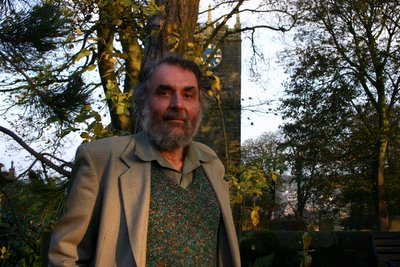
Richard Wilcocks writes:
"It's strange to be talking about the Mendelssohns and the Rossettis in the cellar of the Brontë Parsonage Museum," said artist and poet Ian Emberson (pictured) at the beginning of his talk Three Quartets on 3 November. "I am going to take a wider look at three gifted families, look at their lives, then compare them. Each family was close-knit and each had within it four children who were gifted in various ways."
For the next hour, we were treated to the results of Ian's extensive research, our attention was drawn to some illuminating and sometimes startling coincidences, and many interesting parallels were made.
All three of the significant ancestors of the families were exiles in some way, for example. Moses Mendelssohn, grandfather of Felix, was a partner in a silk firm and a writer on the theme of the Immortality of the Soul, who achieved the status of "protected Jew", which made an enormous difference at a time when Jews were subject to frequent restrictions and humiliations. Gabriel Rossetti was a political agitator and a museum curator who sought asylum in England, where he taught Italian at London University, and of course Patrick Brontë escaped a life of poverty in Ireland to go to Cambridge. All three brought something beautiful, fresh and new from the outside to their country of settlement.
In all three families, formal schooling played little part in the nurture of young talent. The privileged Mendelssohn children - Fanny, Felix, Rebecca and Paul - were accustomed to mingling with distinguished artists and scientists (Goethe included) in their sumptuous residence in Berlin, and private tutors (drawing, painting and languages as well as music) were no problem for their banker father. Felix became an outstanding fencer, gymnast and mathematician as well as a pianist and composer.
The bilingual Rossettis were another self-contained family, not mixing much with the locals, their house packed with Italian visitors (like Paganini), emigres and asylum-seekers. The children were constantly writing, producing their own newspaper (The Hotch Potch), printed on a press conveniently situated in their back garden. Ian picked out the fact that the Brontës were interested in all branches of the arts, that Emily's piano playing was much admired by Ellen Nussey and that Branwell played the flute, the church organ and the piano.
Ian compared the differing expectations of males and females in the three families. Fanny Mendelssohn was possibly as talented as her brother, but her father Abraham wrote to her in a letter that "only what is truly feminine is an ornament to your sex", with music being the ornament, not the career, of course. It was rather like saying that literature can not be the business of a woman's life.
The talk reminded me that it is not just the Brontës who must always be kept in our hearts and minds. After all, Christina Rossetti did write one of the most memorable Christmas Carols, and Felix Mendelssohn has for too long been wrongly associated with the odour of mildewed hymn books.
No comments:
Post a Comment